UK Legal System: Court Structure, Sources of Law, and Business Impacts
VerifiedAdded on 2022/05/31
|13
|2583
|25
Report
AI Summary
This report provides a comprehensive overview of the UK legal system, beginning with an introduction to the legal system's types and functions, and then focusing on the UK's specific constitutional monarchy and common law system. The report details the structure of the UK court system, including the Supreme Court, Court of Appeal, High Court, Crown Court, County Courts, Magistrates’ Courts and the Tribunals Service. It then explores the sources of law, such as common law, legislation, and European Union Law. The role of the government in the law-making process is also examined, breaking down the Bill-to-Act process into nine steps. The report further analyzes the potential impacts of the law on businesses, focusing on employment law, company law, and contract law, and provides case examples. Finally, the report discusses legal reforms, such as those in the Employment Act 2002, and analyzes the potential impacts of legislation, regulations, and standards on businesses.
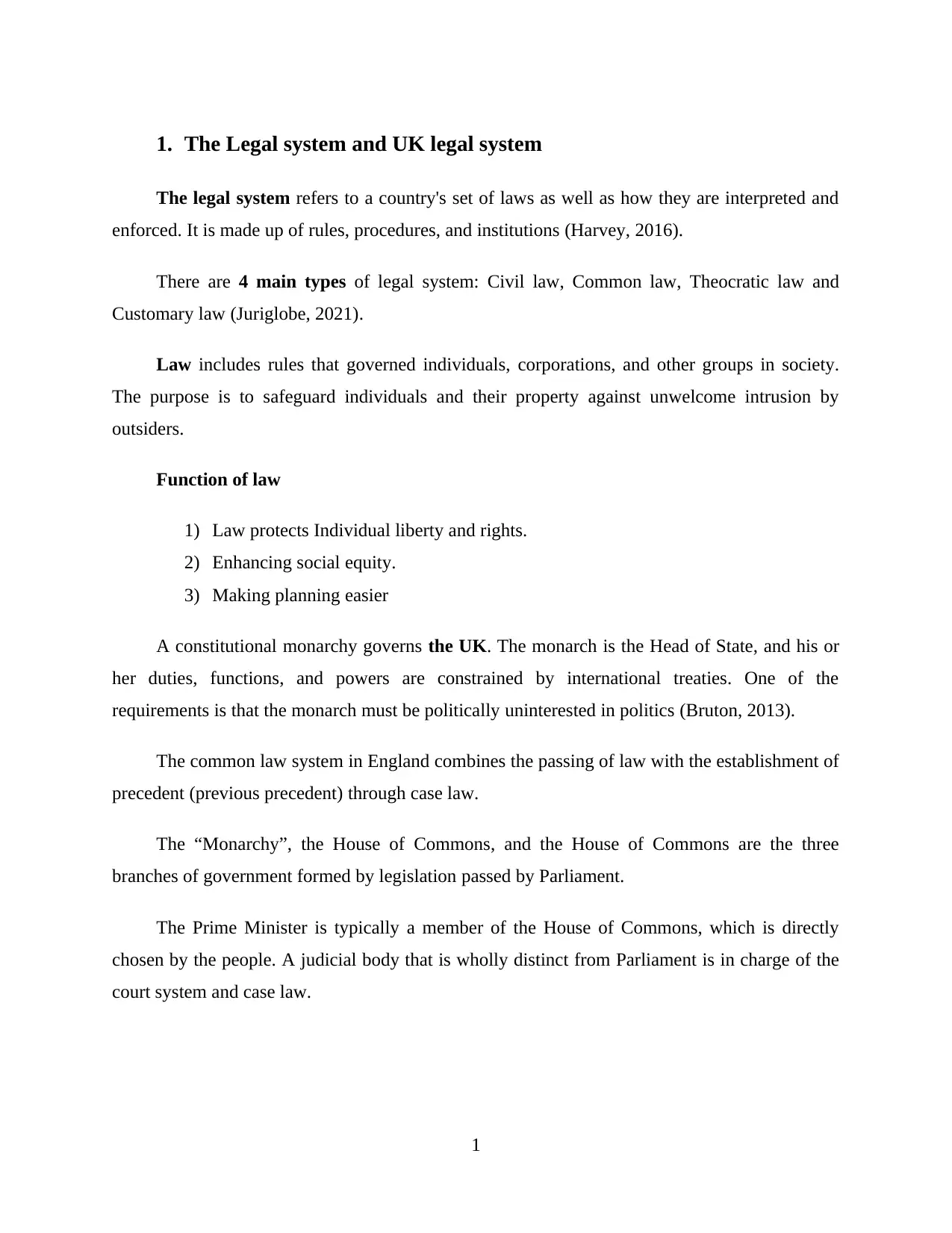
1. The Legal system and UK legal system
The legal system refers to a country's set of laws as well as how they are interpreted and
enforced. It is made up of rules, procedures, and institutions (Harvey, 2016).
There are 4 main types of legal system: Civil law, Common law, Theocratic law and
Customary law (Juriglobe, 2021).
Law includes rules that governed individuals, corporations, and other groups in society.
The purpose is to safeguard individuals and their property against unwelcome intrusion by
outsiders.
Function of law
1) Law protects Individual liberty and rights.
2) Enhancing social equity.
3) Making planning easier
A constitutional monarchy governs the UK. The monarch is the Head of State, and his or
her duties, functions, and powers are constrained by international treaties. One of the
requirements is that the monarch must be politically uninterested in politics (Bruton, 2013).
The common law system in England combines the passing of law with the establishment of
precedent (previous precedent) through case law.
The “Monarchy”, the House of Commons, and the House of Commons are the three
branches of government formed by legislation passed by Parliament.
The Prime Minister is typically a member of the House of Commons, which is directly
chosen by the people. A judicial body that is wholly distinct from Parliament is in charge of the
court system and case law.
1
The legal system refers to a country's set of laws as well as how they are interpreted and
enforced. It is made up of rules, procedures, and institutions (Harvey, 2016).
There are 4 main types of legal system: Civil law, Common law, Theocratic law and
Customary law (Juriglobe, 2021).
Law includes rules that governed individuals, corporations, and other groups in society.
The purpose is to safeguard individuals and their property against unwelcome intrusion by
outsiders.
Function of law
1) Law protects Individual liberty and rights.
2) Enhancing social equity.
3) Making planning easier
A constitutional monarchy governs the UK. The monarch is the Head of State, and his or
her duties, functions, and powers are constrained by international treaties. One of the
requirements is that the monarch must be politically uninterested in politics (Bruton, 2013).
The common law system in England combines the passing of law with the establishment of
precedent (previous precedent) through case law.
The “Monarchy”, the House of Commons, and the House of Commons are the three
branches of government formed by legislation passed by Parliament.
The Prime Minister is typically a member of the House of Commons, which is directly
chosen by the people. A judicial body that is wholly distinct from Parliament is in charge of the
court system and case law.
1
Paraphrase This Document
Need a fresh take? Get an instant paraphrase of this document with our AI Paraphraser
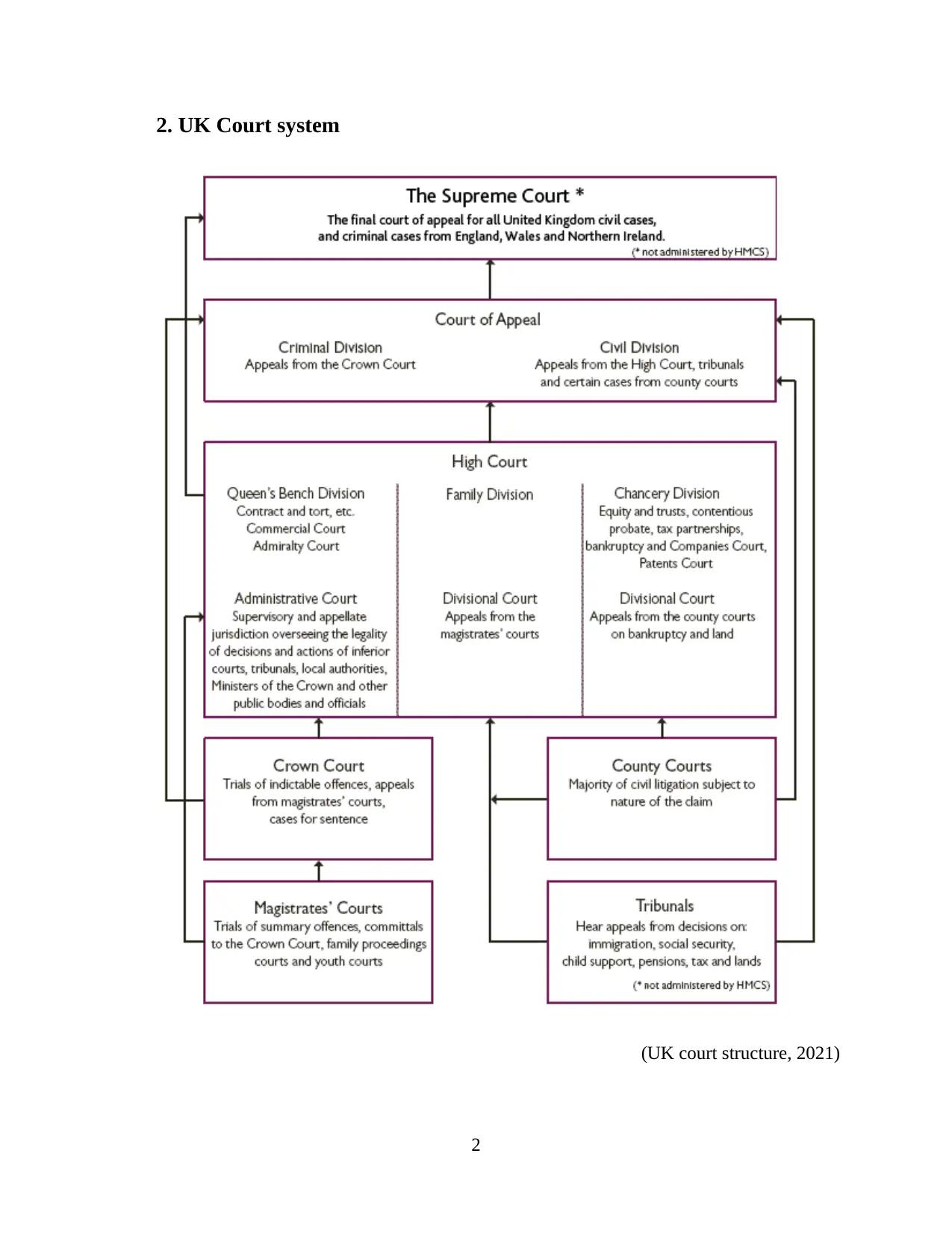
2. UK Court system
(UK court structure, 2021)
2
(UK court structure, 2021)
2
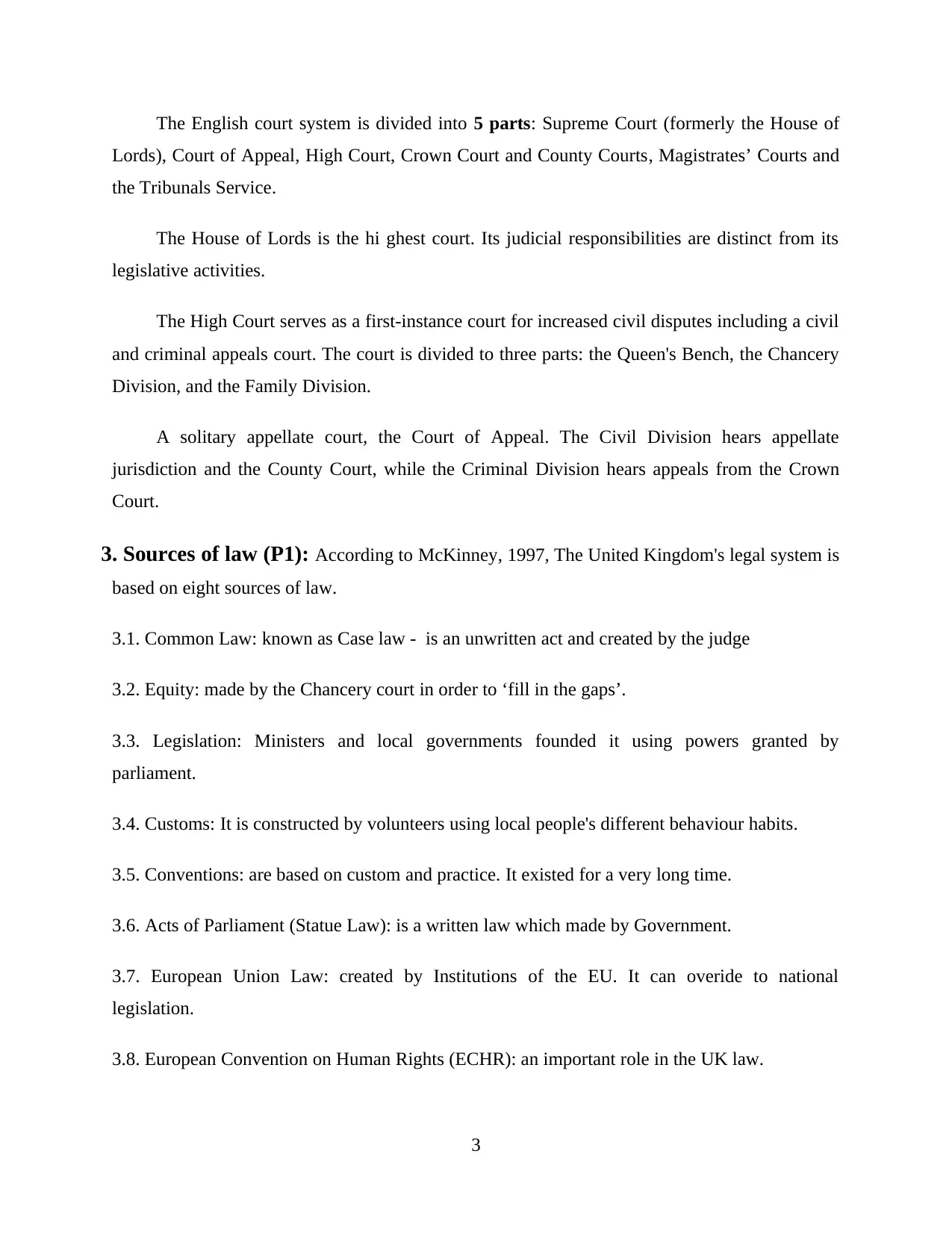
The English court system is divided into 5 parts: Supreme Court (formerly the House of
Lords), Court of Appeal, High Court, Crown Court and County Courts, Magistrates’ Courts and
the Tribunals Service.
The House of Lords is the hi ghest court. Its judicial responsibilities are distinct from its
legislative activities.
The High Court serves as a first-instance court for increased civil disputes including a civil
and criminal appeals court. The court is divided to three parts: the Queen's Bench, the Chancery
Division, and the Family Division.
A solitary appellate court, the Court of Appeal. The Civil Division hears appellate
jurisdiction and the County Court, while the Criminal Division hears appeals from the Crown
Court.
3. Sources of law (P1): According to McKinney, 1997, The United Kingdom's legal system is
based on eight sources of law.
3.1. Common Law: known as Case law - is an unwritten act and created by the judge
3.2. Equity: made by the Chancery court in order to ‘fill in the gaps’.
3.3. Legislation: Ministers and local governments founded it using powers granted by
parliament.
3.4. Customs: It is constructed by volunteers using local people's different behaviour habits.
3.5. Conventions: are based on custom and practice. It existed for a very long time.
3.6. Acts of Parliament (Statue Law): is a written law which made by Government.
3.7. European Union Law: created by Institutions of the EU. It can overide to national
legislation.
3.8. European Convention on Human Rights (ECHR): an important role in the UK law.
3
Lords), Court of Appeal, High Court, Crown Court and County Courts, Magistrates’ Courts and
the Tribunals Service.
The House of Lords is the hi ghest court. Its judicial responsibilities are distinct from its
legislative activities.
The High Court serves as a first-instance court for increased civil disputes including a civil
and criminal appeals court. The court is divided to three parts: the Queen's Bench, the Chancery
Division, and the Family Division.
A solitary appellate court, the Court of Appeal. The Civil Division hears appellate
jurisdiction and the County Court, while the Criminal Division hears appeals from the Crown
Court.
3. Sources of law (P1): According to McKinney, 1997, The United Kingdom's legal system is
based on eight sources of law.
3.1. Common Law: known as Case law - is an unwritten act and created by the judge
3.2. Equity: made by the Chancery court in order to ‘fill in the gaps’.
3.3. Legislation: Ministers and local governments founded it using powers granted by
parliament.
3.4. Customs: It is constructed by volunteers using local people's different behaviour habits.
3.5. Conventions: are based on custom and practice. It existed for a very long time.
3.6. Acts of Parliament (Statue Law): is a written law which made by Government.
3.7. European Union Law: created by Institutions of the EU. It can overide to national
legislation.
3.8. European Convention on Human Rights (ECHR): an important role in the UK law.
3
⊘ This is a preview!⊘
Do you want full access?
Subscribe today to unlock all pages.

Trusted by 1+ million students worldwide
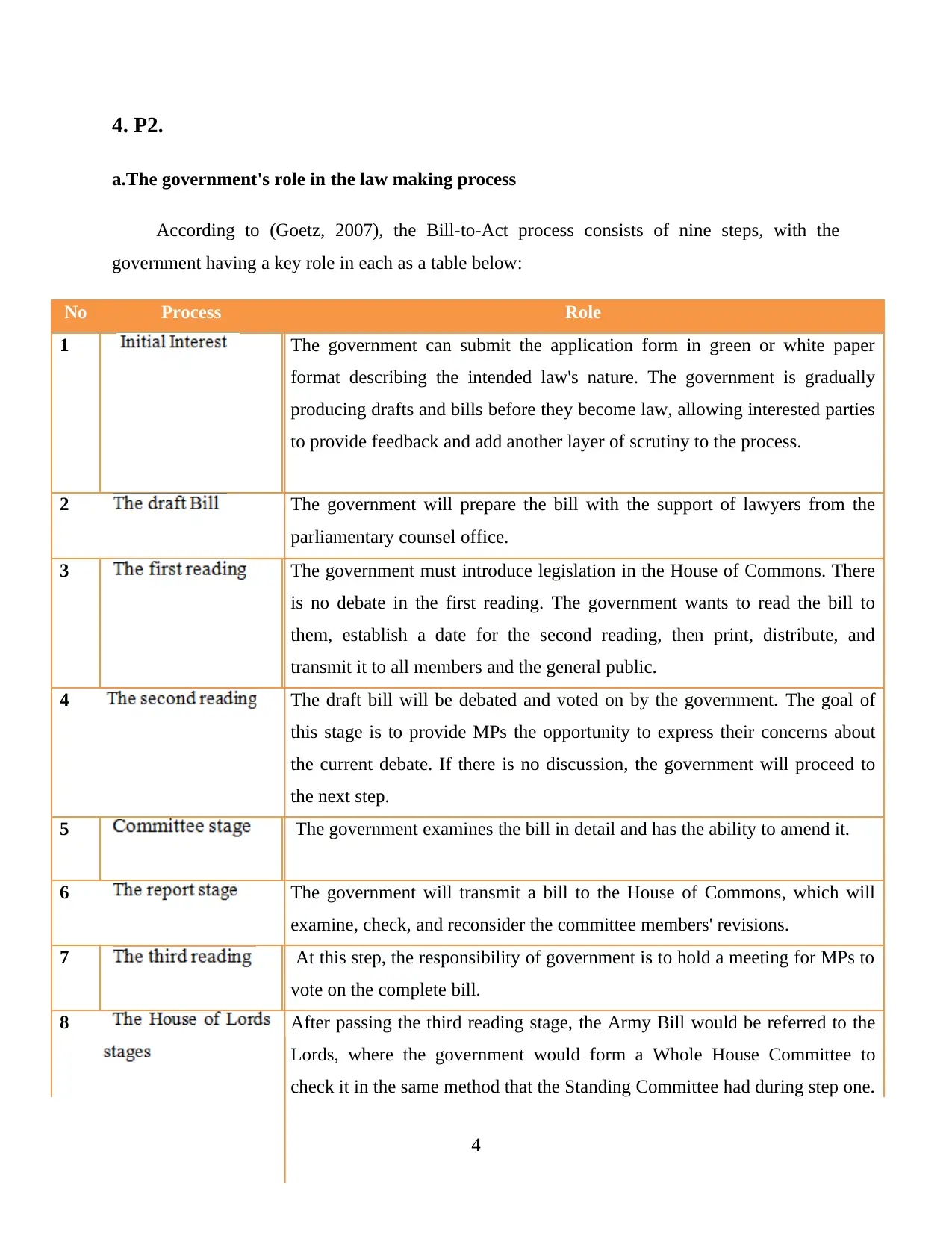
4. P2.
a.The government's role in the law making process
According to (Goetz, 2007), the Bill-to-Act process consists of nine steps, with the
government having a key role in each as a table below:
No Process Role
1 “ The government can submit the application form in green or white paper
format describing the intended law's nature. The government is gradually
producing drafts and bills before they become law, allowing interested parties
to provide feedback and add another layer of scrutiny to the process.
2 The government will prepare the bill with the support of lawyers from the
parliamentary counsel office.
3 The government must introduce legislation in the House of Commons. There
is no debate in the first reading. The government wants to read the bill to
them, establish a date for the second reading, then print, distribute, and
transmit it to all members and the general public.
4 “ The draft bill will be debated and voted on by the government. The goal of
this stage is to provide MPs the opportunity to express their concerns about
the current debate. If there is no discussion, the government will proceed to
the next step.
5 The government examines the bill in detail and has the ability to amend it.
6 The government will transmit a bill to the House of Commons, which will
examine, check, and reconsider the committee members' revisions.
7 At this step, the responsibility of government is to hold a meeting for MPs to
vote on the complete bill.
8
“
After passing the third reading stage, the Army Bill would be referred to the
Lords, where the government would form a Whole House Committee to
check it in the same method that the Standing Committee had during step one.
4
a.The government's role in the law making process
According to (Goetz, 2007), the Bill-to-Act process consists of nine steps, with the
government having a key role in each as a table below:
No Process Role
1 “ The government can submit the application form in green or white paper
format describing the intended law's nature. The government is gradually
producing drafts and bills before they become law, allowing interested parties
to provide feedback and add another layer of scrutiny to the process.
2 The government will prepare the bill with the support of lawyers from the
parliamentary counsel office.
3 The government must introduce legislation in the House of Commons. There
is no debate in the first reading. The government wants to read the bill to
them, establish a date for the second reading, then print, distribute, and
transmit it to all members and the general public.
4 “ The draft bill will be debated and voted on by the government. The goal of
this stage is to provide MPs the opportunity to express their concerns about
the current debate. If there is no discussion, the government will proceed to
the next step.
5 The government examines the bill in detail and has the ability to amend it.
6 The government will transmit a bill to the House of Commons, which will
examine, check, and reconsider the committee members' revisions.
7 At this step, the responsibility of government is to hold a meeting for MPs to
vote on the complete bill.
8
“
After passing the third reading stage, the Army Bill would be referred to the
Lords, where the government would form a Whole House Committee to
check it in the same method that the Standing Committee had during step one.
4
Paraphrase This Document
Need a fresh take? Get an instant paraphrase of this document with our AI Paraphraser
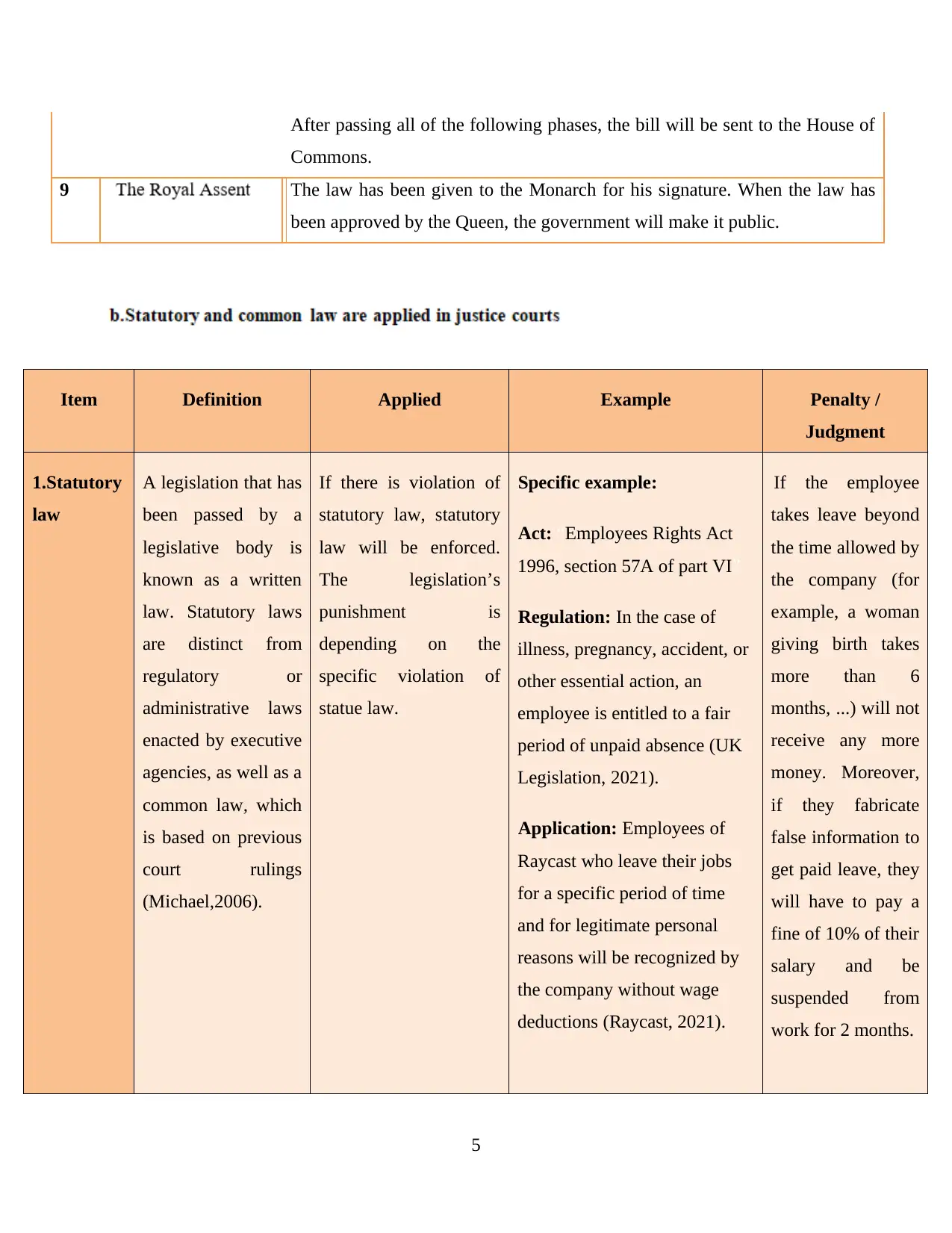
After passing all of the following phases, the bill will be sent to the House of
Commons.
9 The law has been given to the Monarch for his signature. When the law has
been approved by the Queen, the government will make it public.
Item Definition Applied Example Penalty /
Judgment
1.Statutory
law
A legislation that has
been passed by a
legislative body is
known as a written
law. Statutory laws
are distinct from
regulatory or
administrative laws
enacted by executive
agencies, as well as a
common law, which
is based on previous
court rulings
(Michael,2006).
If there is violation of
statutory law, statutory
law will be enforced.
The legislation’s
punishment is
depending on the
specific violation of
statue law.
Specific example:
Act: “Employees Rights Act
1996, section 57A of part VI”
Regulation: In the case of
illness, pregnancy, accident, or
other essential action, an
employee is entitled to a fair
period of unpaid absence (UK
Legislation, 2021).
Application: Employees of
Raycast who leave their jobs
for a specific period of time
and for legitimate personal
reasons will be recognized by
the company without wage
deductions (Raycast, 2021).
If the employee
takes leave beyond
the time allowed by
the company (for
example, a woman
giving birth takes
more than 6
months, ...) will not
receive any more
money. Moreover,
if they fabricate
false information to
get paid leave, they
will have to pay a
fine of 10% of their
salary and be
suspended from
work for 2 months.
5
Commons.
9 The law has been given to the Monarch for his signature. When the law has
been approved by the Queen, the government will make it public.
Item Definition Applied Example Penalty /
Judgment
1.Statutory
law
A legislation that has
been passed by a
legislative body is
known as a written
law. Statutory laws
are distinct from
regulatory or
administrative laws
enacted by executive
agencies, as well as a
common law, which
is based on previous
court rulings
(Michael,2006).
If there is violation of
statutory law, statutory
law will be enforced.
The legislation’s
punishment is
depending on the
specific violation of
statue law.
Specific example:
Act: “Employees Rights Act
1996, section 57A of part VI”
Regulation: In the case of
illness, pregnancy, accident, or
other essential action, an
employee is entitled to a fair
period of unpaid absence (UK
Legislation, 2021).
Application: Employees of
Raycast who leave their jobs
for a specific period of time
and for legitimate personal
reasons will be recognized by
the company without wage
deductions (Raycast, 2021).
If the employee
takes leave beyond
the time allowed by
the company (for
example, a woman
giving birth takes
more than 6
months, ...) will not
receive any more
money. Moreover,
if they fabricate
false information to
get paid leave, they
will have to pay a
fine of 10% of their
salary and be
suspended from
work for 2 months.
5
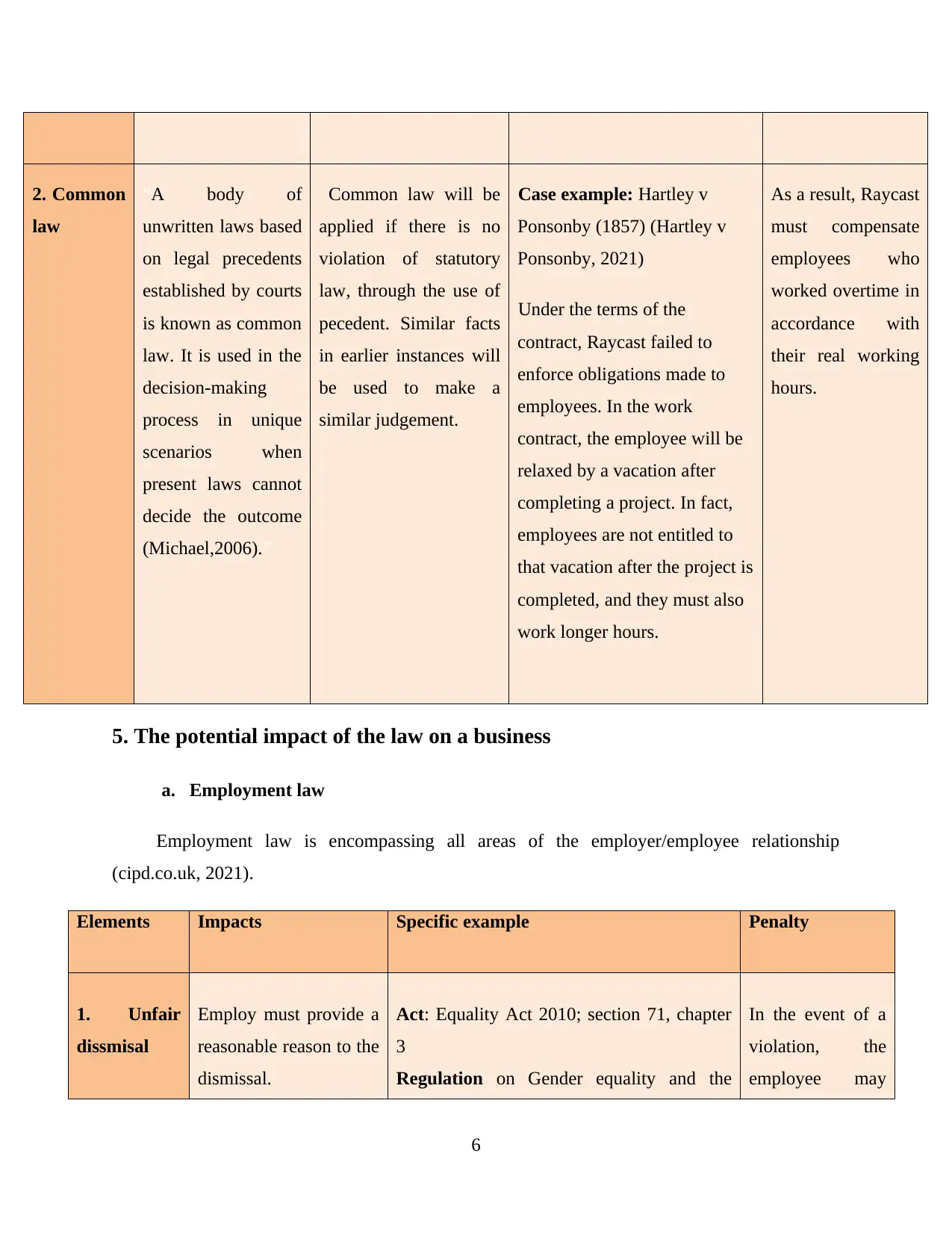
2. Common
law
“A body of
unwritten laws based
on legal precedents
established by courts
is known as common
law. It is used in the
decision-making
process in unique
scenarios when
present laws cannot
decide the outcome
(Michael,2006).”
Common law will be
applied if there is no
violation of statutory
law, through the use of
pecedent. Similar facts
in earlier instances will
be used to make a
similar judgement.
Case example: Hartley v
Ponsonby (1857) (Hartley v
Ponsonby, 2021)
Under the terms of the
contract, Raycast failed to
enforce obligations made to
employees. In the work
contract, the employee will be
relaxed by a vacation after
completing a project. In fact,
employees are not entitled to
that vacation after the project is
completed, and they must also
work longer hours.
As a result, Raycast
must compensate
employees who
worked overtime in
accordance with
their real working
hours.
5. The potential impact of the law on a business
a. Employment law
Employment law is encompassing all areas of the employer/employee relationship
(cipd.co.uk, 2021).
Elements Impacts Specific example Penalty
1. Unfair
dissmisal
Employ must provide a
reasonable reason to the
dismissal.
Act: Equality Act 2010; section 71, chapter
3
Regulation on Gender equality and the
In the event of a
violation, the
employee may
6
law
“A body of
unwritten laws based
on legal precedents
established by courts
is known as common
law. It is used in the
decision-making
process in unique
scenarios when
present laws cannot
decide the outcome
(Michael,2006).”
Common law will be
applied if there is no
violation of statutory
law, through the use of
pecedent. Similar facts
in earlier instances will
be used to make a
similar judgement.
Case example: Hartley v
Ponsonby (1857) (Hartley v
Ponsonby, 2021)
Under the terms of the
contract, Raycast failed to
enforce obligations made to
employees. In the work
contract, the employee will be
relaxed by a vacation after
completing a project. In fact,
employees are not entitled to
that vacation after the project is
completed, and they must also
work longer hours.
As a result, Raycast
must compensate
employees who
worked overtime in
accordance with
their real working
hours.
5. The potential impact of the law on a business
a. Employment law
Employment law is encompassing all areas of the employer/employee relationship
(cipd.co.uk, 2021).
Elements Impacts Specific example Penalty
1. Unfair
dissmisal
Employ must provide a
reasonable reason to the
dismissal.
Act: Equality Act 2010; section 71, chapter
3
Regulation on Gender equality and the
In the event of a
violation, the
employee may
6
⊘ This is a preview!⊘
Do you want full access?
Subscribe today to unlock all pages.

Trusted by 1+ million students worldwide
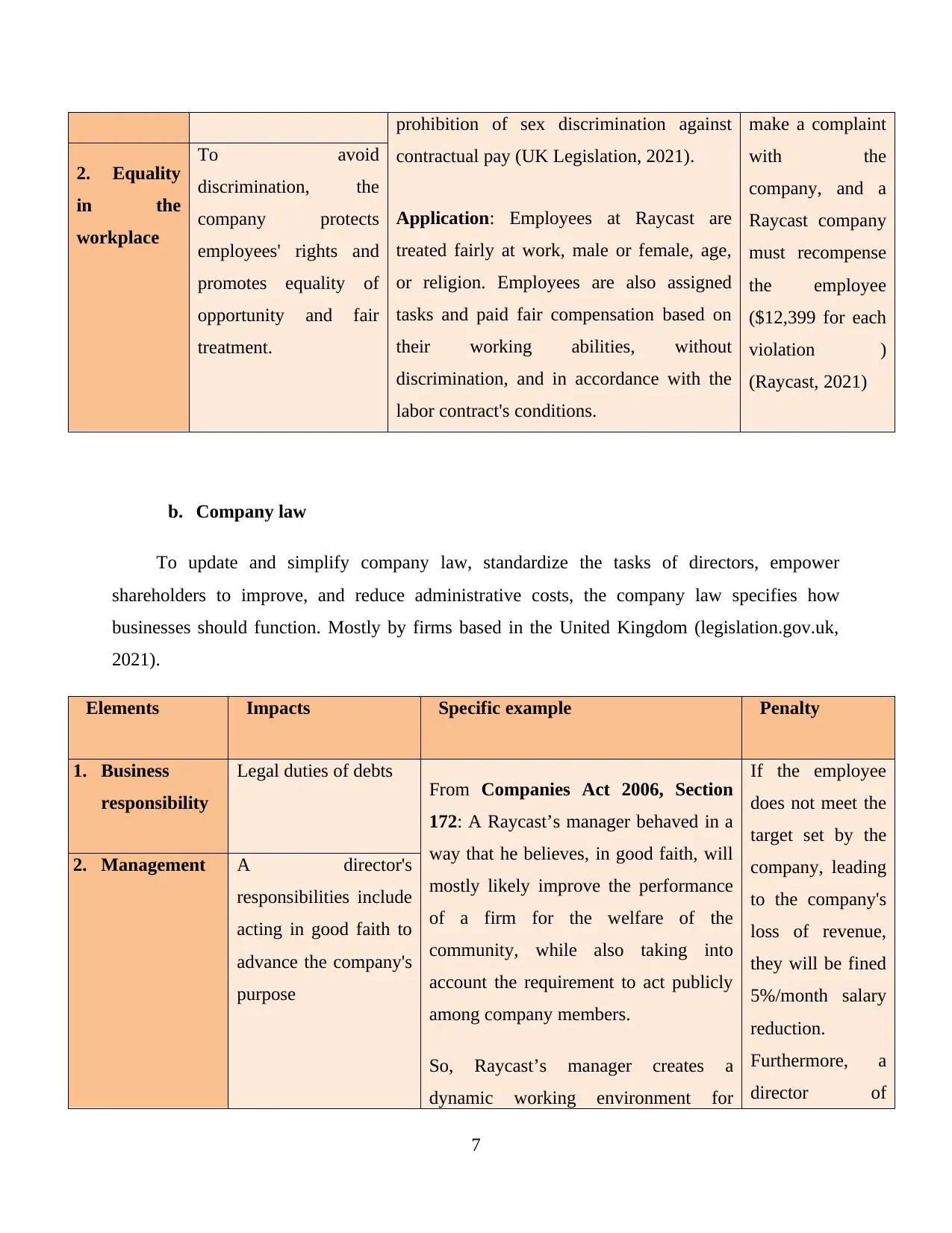
prohibition of sex discrimination against
contractual pay (UK Legislation, 2021).
Application: Employees at Raycast are
treated fairly at work, male or female, age,
or religion. Employees are also assigned
tasks and paid fair compensation based on
their working abilities, without
discrimination, and in accordance with the
labor contract's conditions.
make a complaint
with the
company, and a
Raycast company
must recompense
the employee
($12,399 for each
violation )
(Raycast, 2021)
2. Equality
in the
workplace
To avoid
discrimination, the
company protects
employees' rights and
promotes equality of
opportunity and fair
treatment.
b. Company law
To update and simplify company law, standardize the tasks of directors, empower
shareholders to improve, and reduce administrative costs, the company law specifies how
businesses should function. Mostly by firms based in the United Kingdom (legislation.gov.uk,
2021).
“Elements” “Impacts” “Specific example” “Penalty”
1. Business
responsibility
Legal duties of debts From Companies Act 2006, Section
172: A Raycast’s manager behaved in a
way that he believes, in good faith, will
mostly likely improve the performance
of a firm for the welfare of the
community, while also taking into
account the requirement to act publicly
among company members.
So, Raycast’s manager creates a
dynamic working environment for
If the employee
does not meet the
target set by the
company, leading
to the company's
loss of revenue,
they will be fined
5%/month salary
reduction.
Furthermore, a
director of
2. Management A director's
responsibilities include
acting in good faith to
advance the company's
purpose
7
contractual pay (UK Legislation, 2021).
Application: Employees at Raycast are
treated fairly at work, male or female, age,
or religion. Employees are also assigned
tasks and paid fair compensation based on
their working abilities, without
discrimination, and in accordance with the
labor contract's conditions.
make a complaint
with the
company, and a
Raycast company
must recompense
the employee
($12,399 for each
violation )
(Raycast, 2021)
2. Equality
in the
workplace
To avoid
discrimination, the
company protects
employees' rights and
promotes equality of
opportunity and fair
treatment.
b. Company law
To update and simplify company law, standardize the tasks of directors, empower
shareholders to improve, and reduce administrative costs, the company law specifies how
businesses should function. Mostly by firms based in the United Kingdom (legislation.gov.uk,
2021).
“Elements” “Impacts” “Specific example” “Penalty”
1. Business
responsibility
Legal duties of debts From Companies Act 2006, Section
172: A Raycast’s manager behaved in a
way that he believes, in good faith, will
mostly likely improve the performance
of a firm for the welfare of the
community, while also taking into
account the requirement to act publicly
among company members.
So, Raycast’s manager creates a
dynamic working environment for
If the employee
does not meet the
target set by the
company, leading
to the company's
loss of revenue,
they will be fined
5%/month salary
reduction.
Furthermore, a
director of
2. Management A director's
responsibilities include
acting in good faith to
advance the company's
purpose
7
Paraphrase This Document
Need a fresh take? Get an instant paraphrase of this document with our AI Paraphraser
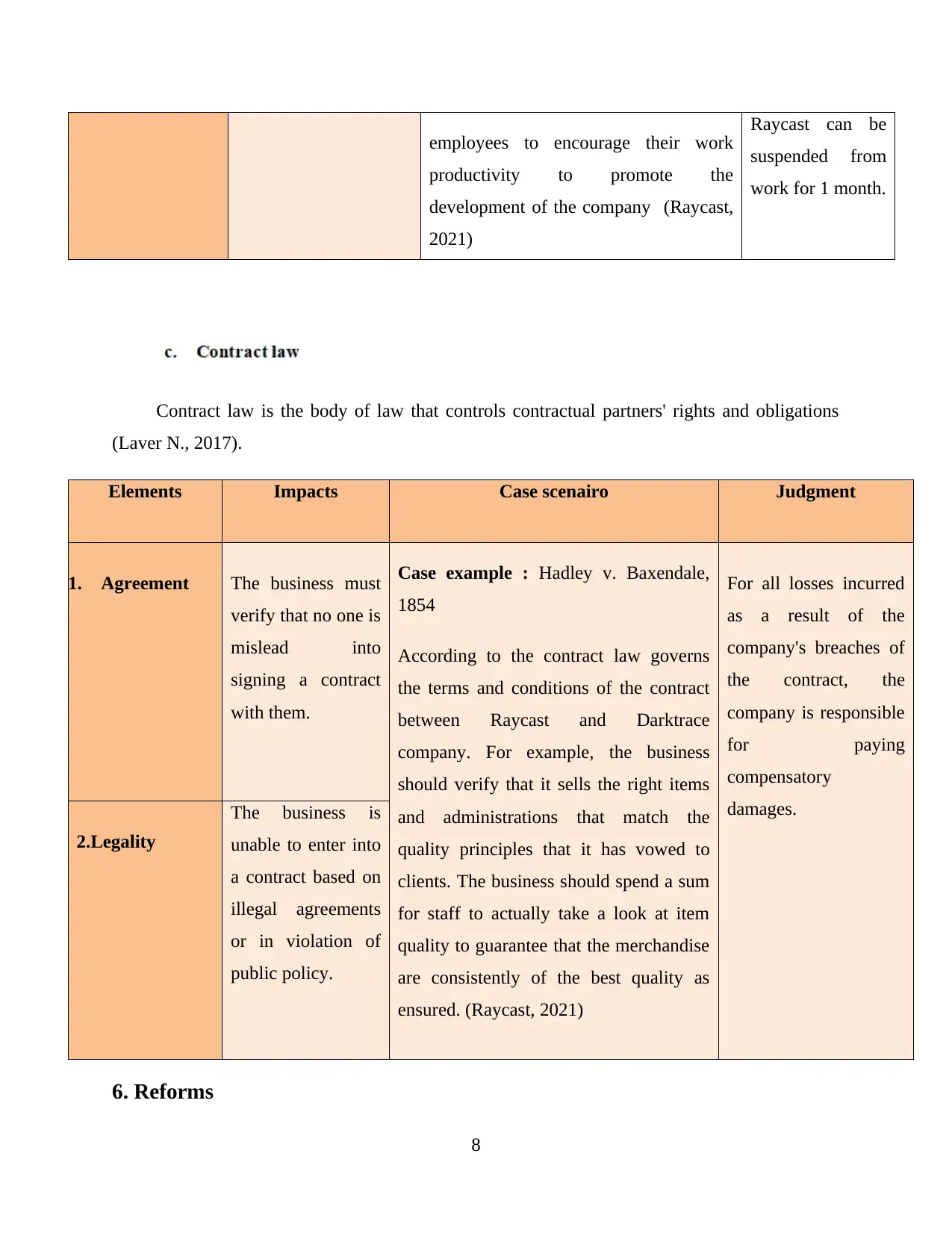
employees to encourage their work
productivity to promote the
development of the company (Raycast,
2021)
Raycast can be
suspended from
work for 1 month.
Contract law is the body of law that controls contractual partners' rights and obligations
(Laver N., 2017).
Elements Impacts Case scenairo Judgment
1. Agreement The business must
verify that no one is
mislead into
signing a contract
with them.
Case example : Hadley v. Baxendale,
1854
According to the contract law governs
the terms and conditions of the contract
between Raycast and Darktrace
company. For example, the business
should verify that it sells the right items
and administrations that match the
quality principles that it has vowed to
clients. The business should spend a sum
for staff to actually take a look at item
quality to guarantee that the merchandise
are consistently of the best quality as
ensured. (Raycast, 2021)
For all losses incurred
as a result of the
company's breaches of
the contract, the
company is responsible
for paying
compensatory
damages.
2.Legality
The business is
unable to enter into
a contract based on
illegal agreements
or in violation of
public policy.
6. Reforms
8
productivity to promote the
development of the company (Raycast,
2021)
Raycast can be
suspended from
work for 1 month.
Contract law is the body of law that controls contractual partners' rights and obligations
(Laver N., 2017).
Elements Impacts Case scenairo Judgment
1. Agreement The business must
verify that no one is
mislead into
signing a contract
with them.
Case example : Hadley v. Baxendale,
1854
According to the contract law governs
the terms and conditions of the contract
between Raycast and Darktrace
company. For example, the business
should verify that it sells the right items
and administrations that match the
quality principles that it has vowed to
clients. The business should spend a sum
for staff to actually take a look at item
quality to guarantee that the merchandise
are consistently of the best quality as
ensured. (Raycast, 2021)
For all losses incurred
as a result of the
company's breaches of
the contract, the
company is responsible
for paying
compensatory
damages.
2.Legality
The business is
unable to enter into
a contract based on
illegal agreements
or in violation of
public policy.
6. Reforms
8
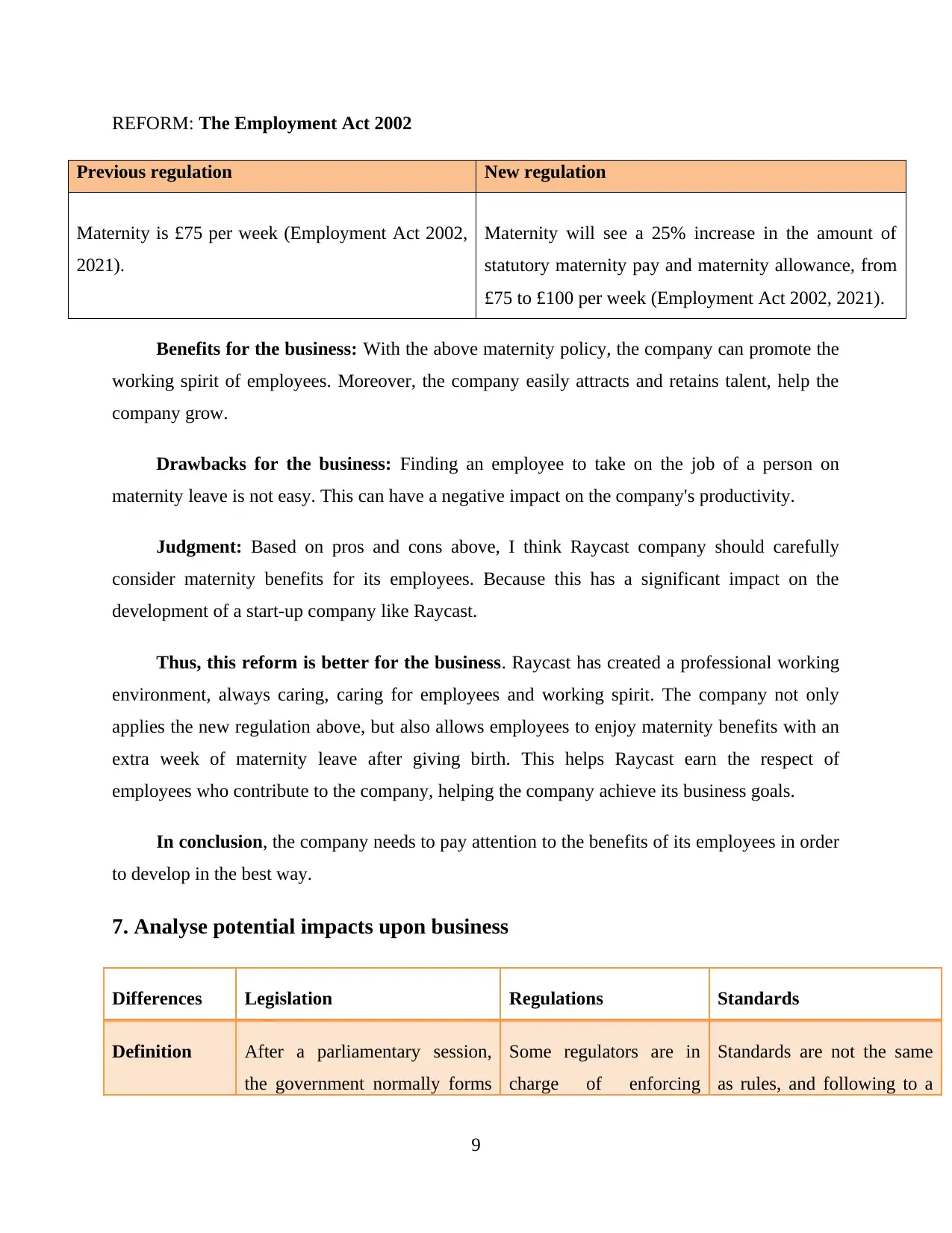
REFORM: The Employment Act 2002
Previous regulation New regulation
Maternity is £75 per week (Employment Act 2002,
2021).
Maternity will see a 25% increase in the amount of
statutory maternity pay and maternity allowance, from
£75 to £100 per week (Employment Act 2002, 2021).
Benefits for the business: With the above maternity policy, the company can promote the
working spirit of employees. Moreover, the company easily attracts and retains talent, help the
company grow.
Drawbacks for the business: Finding an employee to take on the job of a person on
maternity leave is not easy. This can have a negative impact on the company's productivity.
Judgment: Based on pros and cons above, I think Raycast company should carefully
consider maternity benefits for its employees. Because this has a significant impact on the
development of a start-up company like Raycast.
Thus, this reform is better for the business. Raycast has created a professional working
environment, always caring, caring for employees and working spirit. The company not only
applies the new regulation above, but also allows employees to enjoy maternity benefits with an
extra week of maternity leave after giving birth. This helps Raycast earn the respect of
employees who contribute to the company, helping the company achieve its business goals.
In conclusion, the company needs to pay attention to the benefits of its employees in order
to develop in the best way.
7. Analyse potential impacts upon business
Differences Legislation Regulations Standards
Definition After a parliamentary session,
the government normally forms
Some regulators are in
charge of enforcing
Standards are not the same
as rules, and following to a
9
Previous regulation New regulation
Maternity is £75 per week (Employment Act 2002,
2021).
Maternity will see a 25% increase in the amount of
statutory maternity pay and maternity allowance, from
£75 to £100 per week (Employment Act 2002, 2021).
Benefits for the business: With the above maternity policy, the company can promote the
working spirit of employees. Moreover, the company easily attracts and retains talent, help the
company grow.
Drawbacks for the business: Finding an employee to take on the job of a person on
maternity leave is not easy. This can have a negative impact on the company's productivity.
Judgment: Based on pros and cons above, I think Raycast company should carefully
consider maternity benefits for its employees. Because this has a significant impact on the
development of a start-up company like Raycast.
Thus, this reform is better for the business. Raycast has created a professional working
environment, always caring, caring for employees and working spirit. The company not only
applies the new regulation above, but also allows employees to enjoy maternity benefits with an
extra week of maternity leave after giving birth. This helps Raycast earn the respect of
employees who contribute to the company, helping the company achieve its business goals.
In conclusion, the company needs to pay attention to the benefits of its employees in order
to develop in the best way.
7. Analyse potential impacts upon business
Differences Legislation Regulations Standards
Definition After a parliamentary session,
the government normally forms
Some regulators are in
charge of enforcing
Standards are not the same
as rules, and following to a
9
⊘ This is a preview!⊘
Do you want full access?
Subscribe today to unlock all pages.

Trusted by 1+ million students worldwide
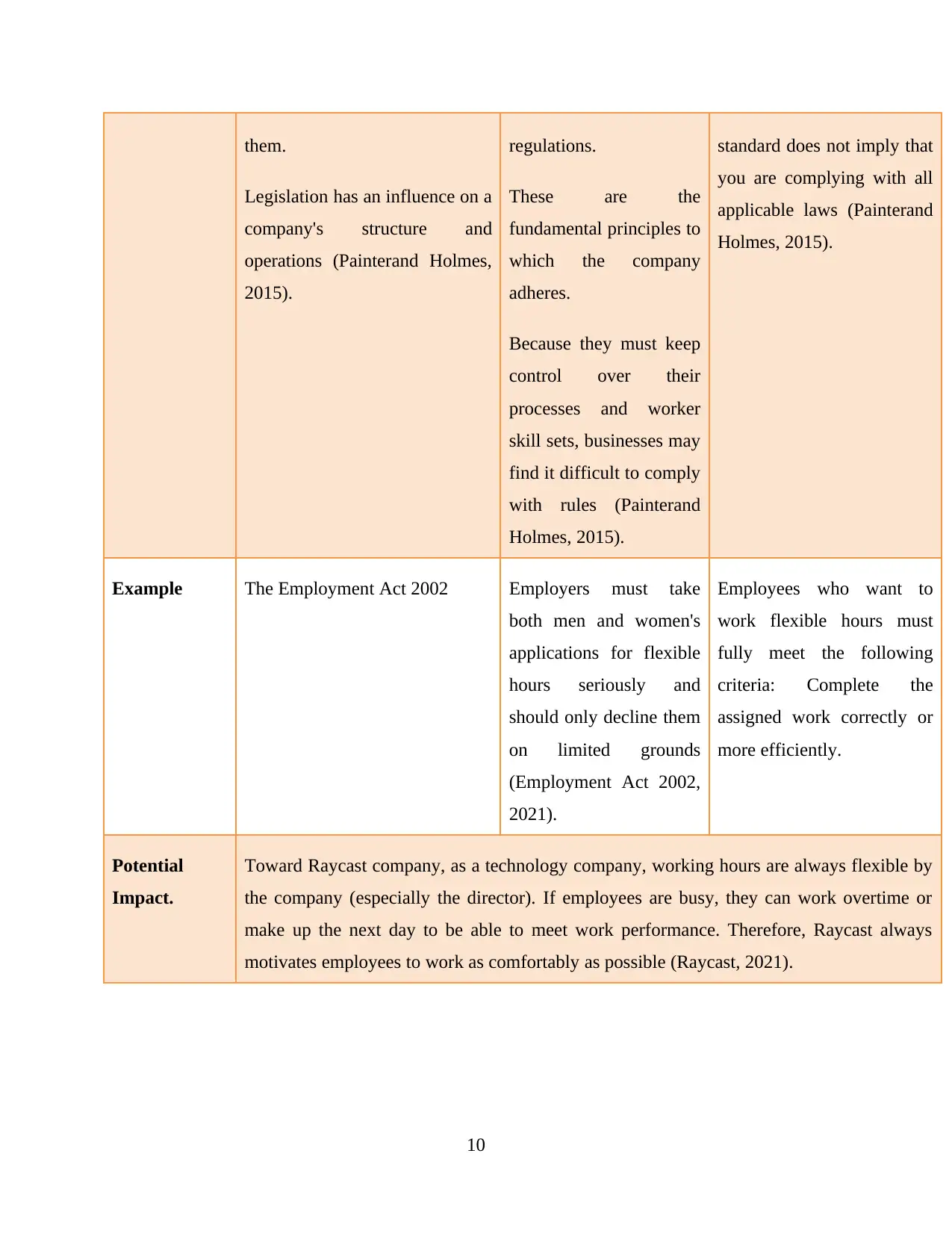
them.
Legislation has an influence on a
company's structure and
operations (Painterand Holmes,
2015).
regulations.
These are the
fundamental principles to
which the company
adheres.
Because they must keep
control over their
processes and worker
skill sets, businesses may
find it difficult to comply
with rules (Painterand
Holmes, 2015).
standard does not imply that
you are complying with all
applicable laws (Painterand
Holmes, 2015).
Example The Employment Act 2002 Employers must take
both men and women's
applications for flexible
hours seriously and
should only decline them
on limited grounds
(Employment Act 2002,
2021).
Employees who want to
work flexible hours must
fully meet the following
criteria: Complete the
assigned work correctly or
more efficiently.
Potential
Impact.
Toward Raycast company, as a technology company, working hours are always flexible by
the company (especially the director). If employees are busy, they can work overtime or
make up the next day to be able to meet work performance. Therefore, Raycast always
motivates employees to work as comfortably as possible (Raycast, 2021).
10
Legislation has an influence on a
company's structure and
operations (Painterand Holmes,
2015).
regulations.
These are the
fundamental principles to
which the company
adheres.
Because they must keep
control over their
processes and worker
skill sets, businesses may
find it difficult to comply
with rules (Painterand
Holmes, 2015).
standard does not imply that
you are complying with all
applicable laws (Painterand
Holmes, 2015).
Example The Employment Act 2002 Employers must take
both men and women's
applications for flexible
hours seriously and
should only decline them
on limited grounds
(Employment Act 2002,
2021).
Employees who want to
work flexible hours must
fully meet the following
criteria: Complete the
assigned work correctly or
more efficiently.
Potential
Impact.
Toward Raycast company, as a technology company, working hours are always flexible by
the company (especially the director). If employees are busy, they can work overtime or
make up the next day to be able to meet work performance. Therefore, Raycast always
motivates employees to work as comfortably as possible (Raycast, 2021).
10
Paraphrase This Document
Need a fresh take? Get an instant paraphrase of this document with our AI Paraphraser
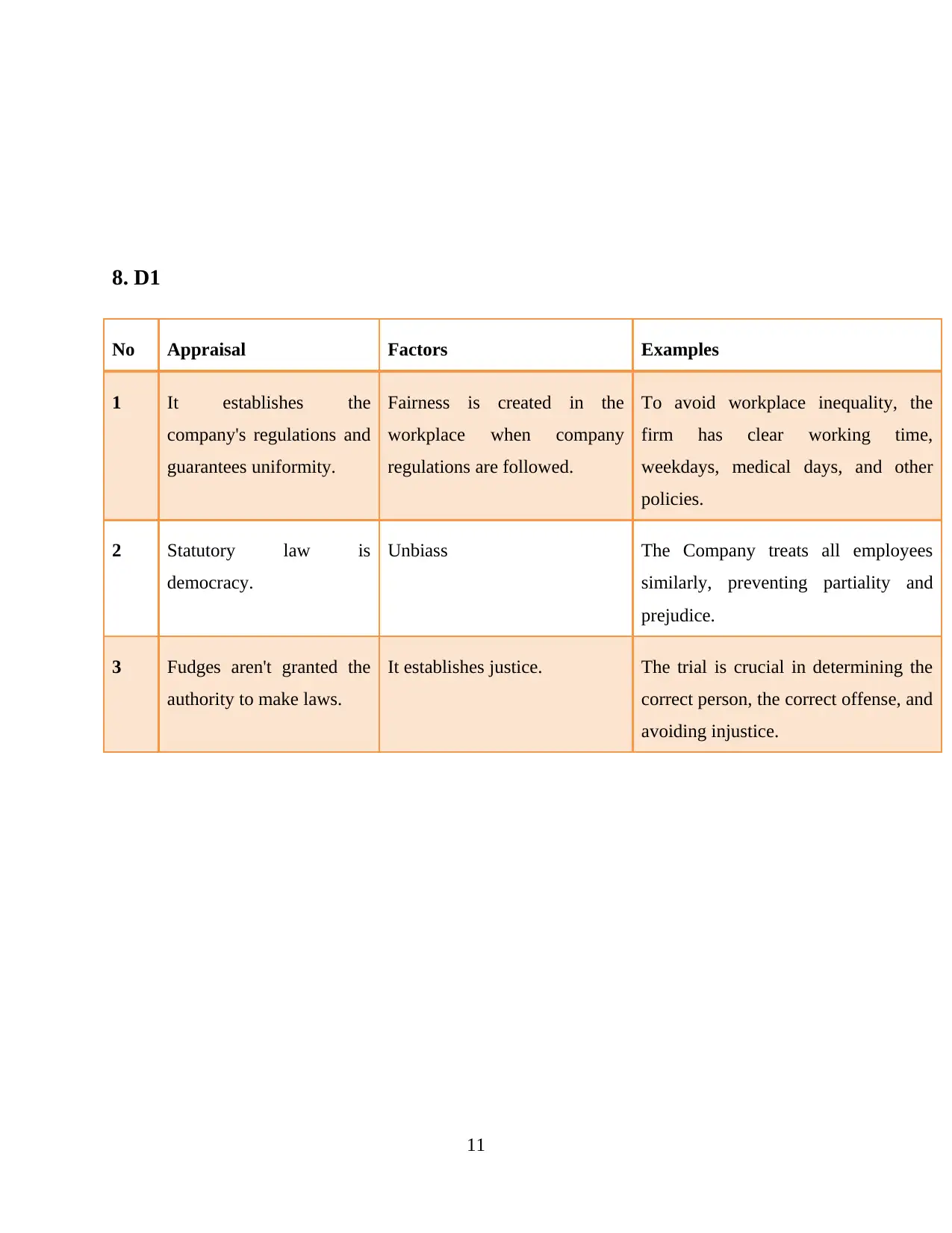
8. D1
No Appraisal Factors Examples
1 It establishes the
company's regulations and
guarantees uniformity.
Fairness is created in the
workplace when company
regulations are followed.
To avoid workplace inequality, the
firm has clear working time,
weekdays, medical days, and other
policies.
2 Statutory law is
democracy.
Unbiass The Company treats all employees
similarly, preventing partiality and
prejudice.
3 Fudges aren't granted the
authority to make laws.
It establishes justice. The trial is crucial in determining the
correct person, the correct offense, and
avoiding injustice.
11
No Appraisal Factors Examples
1 It establishes the
company's regulations and
guarantees uniformity.
Fairness is created in the
workplace when company
regulations are followed.
To avoid workplace inequality, the
firm has clear working time,
weekdays, medical days, and other
policies.
2 Statutory law is
democracy.
Unbiass The Company treats all employees
similarly, preventing partiality and
prejudice.
3 Fudges aren't granted the
authority to make laws.
It establishes justice. The trial is crucial in determining the
correct person, the correct offense, and
avoiding injustice.
11
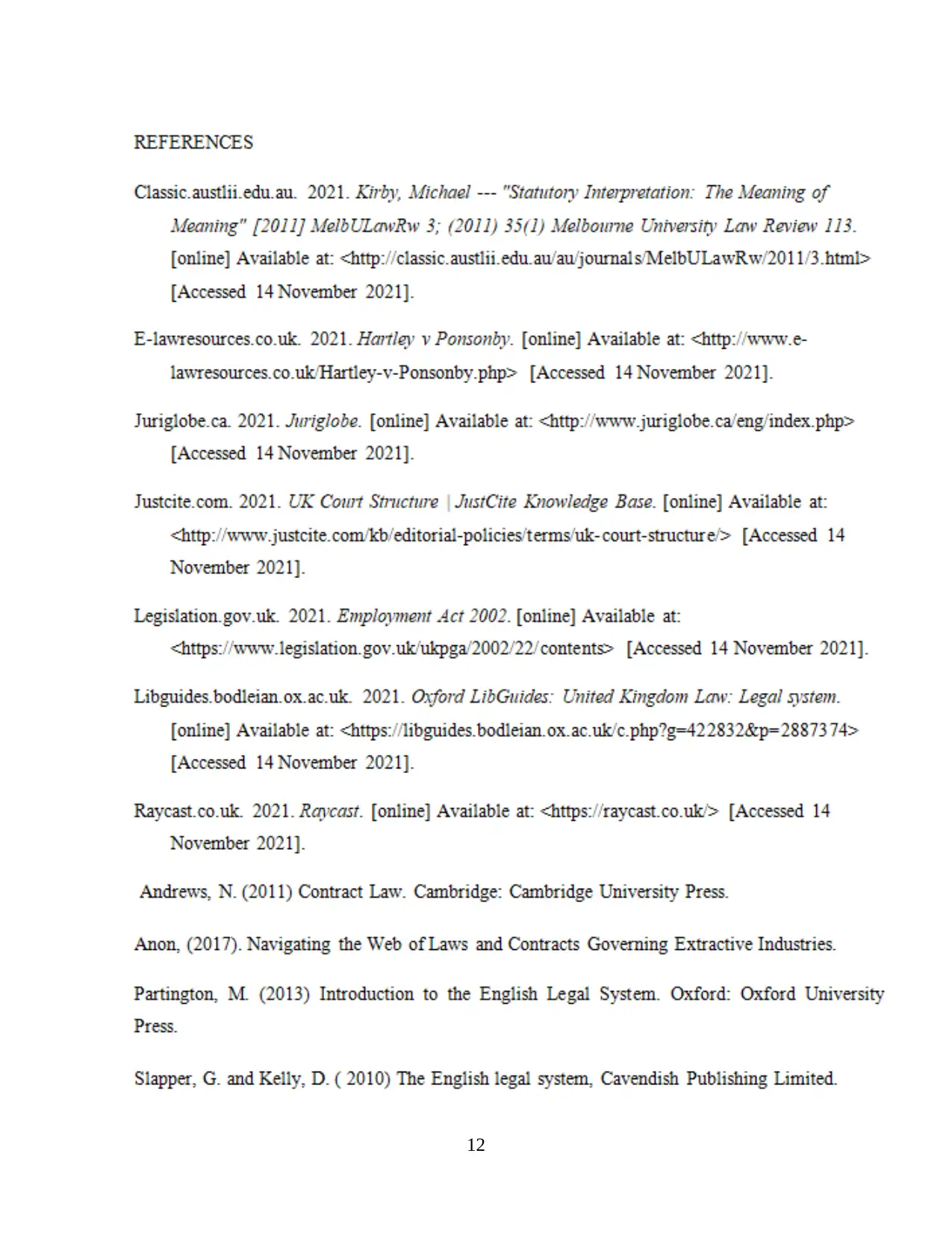
12
⊘ This is a preview!⊘
Do you want full access?
Subscribe today to unlock all pages.

Trusted by 1+ million students worldwide
1 out of 13
Related Documents
Your All-in-One AI-Powered Toolkit for Academic Success.
+13062052269
info@desklib.com
Available 24*7 on WhatsApp / Email
![[object Object]](/_next/static/media/star-bottom.7253800d.svg)
Unlock your academic potential
Copyright © 2020–2026 A2Z Services. All Rights Reserved. Developed and managed by ZUCOL.




